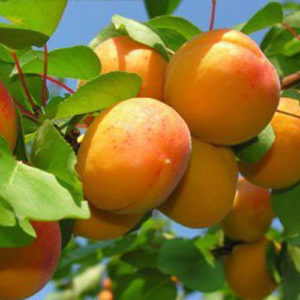
Apricots (Prunus armeniaca) are small drupes consisting of a soft, tangy flesh beneath a thin outer skin and a centrally located single pit often called as ‘stone’. They are typically yellow or orange, with a slight tinge of red on one side. Apricots can be consumed fresh, dried or canned. They can be eaten as a whole without peeling off the outer skin. One small apricot contains about 17 calories, raw or dried, has only a trace of fat. A single apricot has only a small amount of protein but is a good source of vitamin A and Vitamin C. Apricots contain phytonutrients, including antioxidants such as poly- phenols, flavonoids and beta-carotene. They also have good mineral content which includes potassium, copper, manganese, magnesium and phosphorus. They are a very good source of dietary fiber, like most fruits.
STORAGE CONDITIONS:
- Fresh :
- Temperature: 0°C
- Relative Humidity : 90-95%
- Storage Period: 1-2 weeks
- Frozen :
- Temperature : 0 to -5°C
- Storage Period: 1year+
- In moisture proof, air tight packaging
- Dried :
- Temperature : 0 to 4°C
- Storage Period: 1 year
- In moisture proof, air tight container
HEALTH BENEFITS :
-
- Helps in relieving constipation: Like most fresh fruits, apricots are also rich in dietary fiber which is good for digestive system and helps relieve constipation.
-
- Improves Heart Health : A high amount of vitamin C, as well as potassium and dietary fiber, all contribute to good cardiovascular health. Potassium lowers blood pressure by relaxing the tension of blood vessels and arteries, while dietary fiber and scraps the excess cholesterol from the lining of the vessels and arteries, thereby clearing them and reducing the strain on the heart.
-
- Improves metabolism : Fluid levels throughout the body are dependent mainly on two minerals, potassium and sodium. The high amounts of potassium in apricots has been linked to maintaining fluid balance in the body and ensuring that energy is properly distributed to the organs and muscles.
-
- Good for the Skin: The combination of Vitamin C, A and phytonutrients ensures good skin. The antioxidants in the apricot also slow the ageing process. Eating a few apricots daily can highly improve the skin quality.
-
- Strengthens Your Bones : Calcium is much required in the formation and development of bones and apricot has lots of it. Also without enough potassium in the body the calcium is not absorbed and disposed of uniformly. Apricots have both of them.
